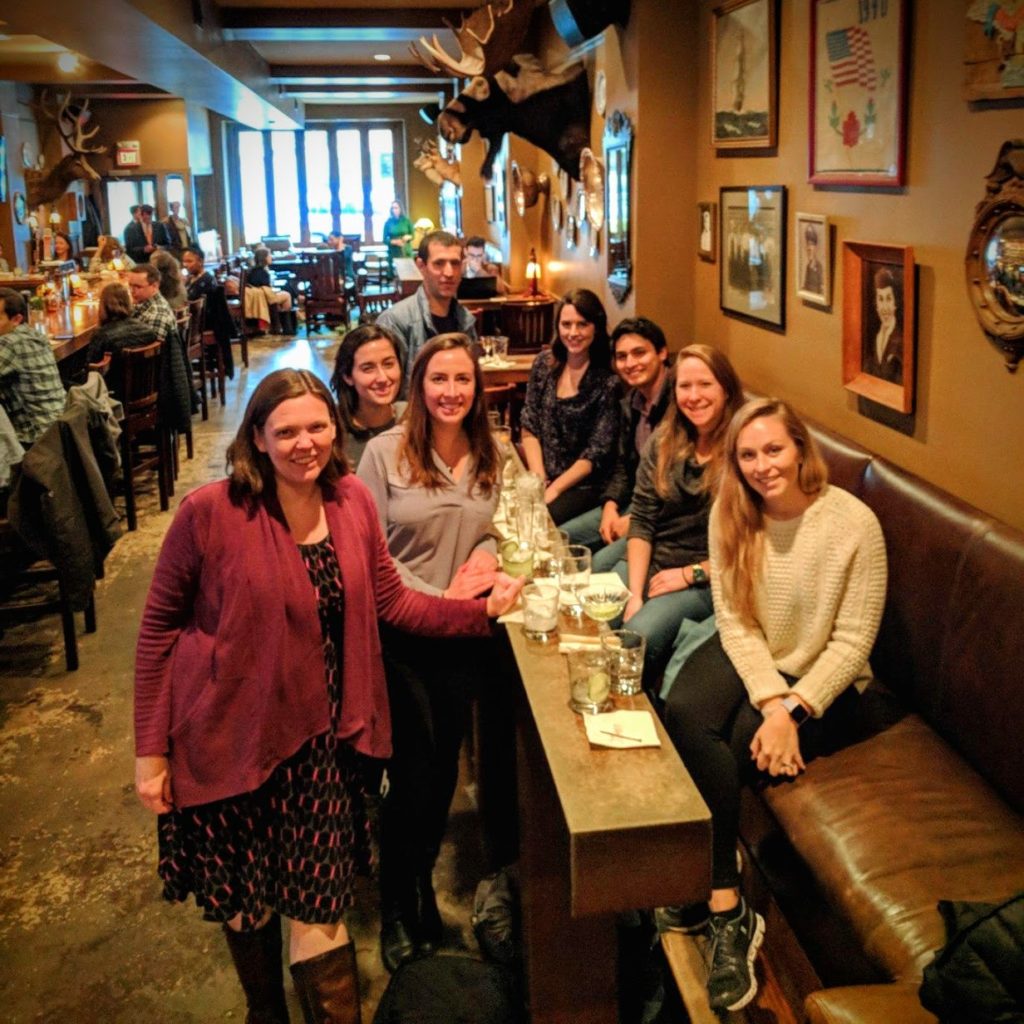Today’s blog is guest-written by Susanna Harris, a graduate student at the University of North Carolina in Chapel Hill.
It’s one thing to hear that everything is going to be okay. It’s another to know it and make it that way.

Photo provided by Susanna Harris
At the end of a lab meeting where I had outlined my last of six years getting my PhD, my advisor announced she would be moving the lab from North Carolina to Massachusetts in about six months. Just when everything had settled into place, this announcement turned my bookshelf of plans on its side once again. Suddenly, I didn’t know what would happen next.
I chose to go to grad school partly to challenge myself to accept uncertainty. When I started my PhD in Microbiology in 2014, I thought this would mean reading new papers and adjusting experiments accordingly. As it has turned out, the real challenge has been to constantly get back up as life and graduate school knock me flat on my ass. Yes, I needed strength to power through, but even more than that, I needed resilience.
Resilience is the ability to bend without breaking; to pivot when our path is blocked and continue onwards; to get back up when we fall from the climb. I couldn’t have predicted my advisor would move; the entire lab was in a state of shock at the end of that meeting. With my heart still racing, I told myself it would be okay. Unlike in years past, I knew I had the resilience to figure this out.
We develop resilience through trial and error. Luckily, graduate school provides us with plenty of both. Each trial gives us a new opportunity to learn from our previous errors and to see how we have improved over time. If building resilience is our goal, rather than attaining perfection, we can use graduate school as a training ground for long term success. Instead of seeing these moments of difficulty as roadblocks, we can view them as hurdles to grow our strength and agility. This combination of trust in our abilities and honesty with ourselves makes us more flexible when the next unexpected hurdle arises.
Here are a few guidelines, to be used in any order to help navigate building resilience when given your next “opportunity” (yes, this is a bit tongue-in-cheek) to grow. I’ll use my recent situation with the lab-moving announcement as an example.
1. Assess the situation as objectively as possible.
Take a moment or two (or a few days, even) to calm yourself down before jumping into action. Once we are settled and able to think clearly about the circumstances, we can use our science training to reason through what is really going on. First, we need to pinpoint what exactly the issue is, and why it is causing fear or anguish. What is the obstacle that we are facing – is it the situation itself or the feelings associated with it? Once we know what the real problem is, we can also imagine what successful outcomes might look like. Depending on the issue, you might be able to find concrete directive or you consider this question in an abstract way.
After the lab meeting, I took a few days off to think about what was going to change based on this news, what the foreseeable problems were, and what I was afraid of. The problems: disruption of plans, increased time of graduation, loss of mentorship, fear of failure or loss of motivation. The desired outcomes: to graduate within the same timescale as originally anticipated under guidance from a mentor
2. Use your support network.
We are surrounded by people with different viewpoints and skillsets, which can help us to identify and navigate tricky moments. Taking the time to build relationships with people, whether personally or professionally, will help you in the long run. It’s okay to actively design your network – this may include friends, family, your mentor, others in your institution, therapists, yoga teachers… whoever you feel comfortable with and who wants to see you succeed under your own conditions. Defining these things can be very difficult, especially under stressful circumstances; objectivity and level-headedness might be best guided by others, who can see our situation from different viewpoints.
I immediately called my friend Abbie, a fellow graduate student at a different university, to help talk me down and sort out my options. A bit later, I contacted my Director of Graduate Studies to set up a meeting. He understood the situation and the directions available to me much more than anyone else and more than I could have found through just searching the internet.
3. Iteratively test possible solutions.
As you can see in step 1, three of my concerns were about logistics of graduating and two were actually about the feelings themselves. Once I laid them out, without judgement, I could decide what success was to me: to graduate within my original timeframe. This is where out skillsets as scientists really come in handy. Define what you can and can’t change, write down a few possible plans of action, weigh them by pros and cons, and just get started.
I could panic and try to finish everything at once and leave as soon as possible. But I didn’t want my final work to be rushed, and I could foresee a situation where I could still graduate in the normal amount of time. So, I needed to figure out a way to keep with my timeline and find the resources I needed to finish up while my mentor and the lab were moving away.
4. Be patient.
The most important tool to build resilience and the biggest sign that you are growing it is having patience. Depending on the situation, the first plan of action might pan out or we might have to reassess many times over. That’s okay! You’re still learning. And you’re building resilience along the way.
These guidelines are meant to ease the process, but it is the process itself that grows the resilience. It will be slow, it might be painful, but you can do this.
It took months to get answers about when the move would happen, who would stay or leave, how my timeline would be affected. It was frustrating. I wanted to know IMMEDIATELY. But my therapist pointed out that, even with answers, my timeline and my plans wouldn’t change much. I just had to ride it out.
5. Appreciate your progress.
We can only see the distance we have come by looking back at our path. Take time to appreciate where you have grown, recognize the difficult decisions you had to make, and remind yourself to believe in your own resilience.
Having dealt with clinical depression and anxiety disorders for my entire adult life, this combination of ruined plans and total uncertainty threatened to throw me into a downward spiral – something that I had experienced many times over and am constantly working to avoid. Thanks to the work I have been doing during the “easy times” and the amazing people who surround me, I got through this time without a meltdown. Maybe that seems like no big deal to some, but it was everything to me.
When in doubt, remind yourself of all the other things you have accomplished. You’ve faced worse and have gotten through it. You’ve got this one, too.
Most people get to graduate school because they are high-achievers – smart, capable, and generally great at designing plans. Science doesn’t care about these plans, and the ability to adapt to new findings is key to becoming a great researcher. But preparing for and accepting change in our lives is just as important for our growth as scientists, whether our hypotheses are disproven or our life plan suddenly upended. Being resilient does not mean we are unshakable or even unbreakable; resilience cannot be measured until it is tested. Being resilient means facing the challenges we cannot predict and saying “it will be okay” . . . and believing it.

Susanna L. Harris is a PhD student at the University of North Carolina in Chapel Hill. Susanna studies how different types of bacteria stick to the roots of plants. She hopes this research could help improve agricultural use of beneficial bacteria in place of harsh chemical fertilizers.
Susanna started PhD Balance to empower students to build personal and professional resilience during Graduate School.
Looking for more resources for graduate school? Check out our Student Resource Center, where you can find tips for job searching and resume building, alongside helpful resources for common techniques you might use in the lab.
Latest posts by Promega (see all)
- One Health and H5N1: Promega’s Commitment to Holistic Solutions - April 8, 2025
- Overcoming qPCR Inhibitors: Strategies for Reliable Quantification - March 13, 2025
- Celebrating Creativity and Innovation: The 2025 Promega Employee Art Showcase - February 4, 2025
